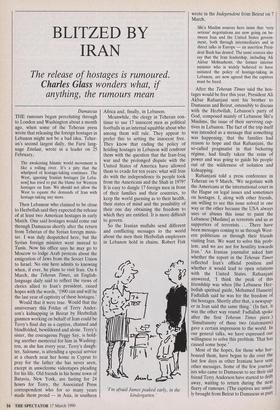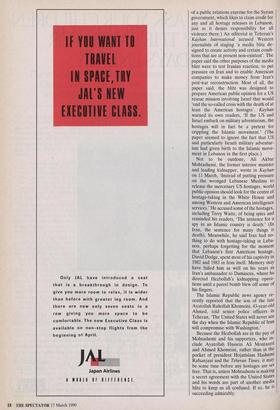BLITZED BY IRAN
The release of hostages is rumoured.
Charles Glass wonders what, if
anything, the rumours mean
Damascus THE rumours began percolating through to London and Washington about a month ago, when some of the Teheran press wrote that releasing the foreign hostages in Lebanon might not be a bad idea. Teher- an's second largest daily, the Farsi lang- uage Ettelaat, wrote in a leader on 25 February,
The awakening Islamic world movement is like a rolling river. It's a pity that the whirlpool of hostage-taking continues. The West, ignoring Iranian hostages [in Leba- non] has tried to put the blame for Western hostages on Iran. We should not allow the West to equate the demands of Iran with hostage-taking any more.
Then Lebanese who claimed to be close to Hezbollah said they expected the release of at least two American hostages in early March. One said hostages would come out through Damascus shortly after the return from Teheran of the Syrian foreign minis- ter. I was duly despatched here, but the Syrian foreign minister went instead to Tunis. Now his office says he may go to Moscow to lodge Arab protests about the emigration of Jews from the Soviet Union to Israel. No one here admits to knowing when, if ever, he plans to visit Iran. On 6 March, the Teheran Times, an English- language daily said to reflect the views of clerics allied to Iran's president, raised hopes with the words, '1990 can and will be the last year of captivity of these hostages.'
Would that it were true. Would that the anniversary this Friday of Terry Ander- son's kidnapping in Beirut by Hezbollah gunmen working on behalf of Iran could be Terry's final day as a captive, chained and blindfolded, bewildered and alone. Terry's sister, the courageous Peggy Say, is hold- ing another memorial for him in Washing- ton, as she has every year. Terry's daugh- ter, Saloume, is attending a special service at a church near her home in Cyprus to pray for the father she has never seen, except in unwelcome videotapes pleading for his life. Old friends in his home town of Batavia, New York, are fasting for 24 hours for Terry, the Associated Press correspondent who for so many years made them proud — in Asia, in southern Africa and, finally, in Lebanon.
Meanwhile, the clergy in Teheran con- tinue to use 17 innocent men as political footballs in an internal squabble about who among them will rule. They appear to prefer this to setting the innocent free. They know that ending the policy of holding hostages in Lebanon will confront them with the question that the Iran-Iraq war and the prolonged dispute with the United States of America have allowed them to evade for ten years: what will Iran do with the independence its people took from the Americans and the Shah in 1979? It is easy to dangle 17 foreign men in front of their families and their countries, to keep the world guessing as to their health, their states of mind and the possibility of their one day obtaining the freedom to which they are entitled. It is more difficult to govern.
So the Iranian mullahs send different and conflicting messages to the world about the men their Hezbollah employees in Lebanon hold in chains. Robert Fisk 'I'm afraid James peaked early, in the kindergarten.' wrote in the Independent from Beirut on 7 March,
Shi'a Muslim sources here insist that 'very serious' negotiations are now going on be- tween Iran and the United States govern- ment, both through intermediaries and in direct talks in Europe — an assertion Presi- dent Bush has denied. The same sources also say that the Iran leadership, including Ali Akbar Mohtashemi, the former interior minister who is widely believed to have initiated the policy of hostage-taking in Lebanon, are now agreed that the captives must be freed.
After the Teheran Times said the hos- tages would be free this year, President Ali Akbar Rafsanjani sent his brother to Damascus and Beirut, ostensibly to discuss with the Hezbollah, Lebanon's party of God, composed mainly of Lebanese Shi'a Muslims, the issue of their surviving cap- tives in Lebanon. The fact of the trip itself was intended as a message that something was happening, that the families had reason to hope and that Rafsanjani, the so-called pragmatist in that bickering regime, had finally taken the reins of power and was going to guide his people out of the wilderness of isolation and kidnapping.
Rafsanjani told a press conference in Teheran on 9 March, 'We negotiate with the Americans at the international court in the Hague on legal issues and sometimes on hostages. I, along with other friends, am willing to see this issue solved in one way or the other because the USA always uses or abuses this issue to paint the Lebanese [Muslims] as terrorists and us as supporters of terrorists. . . There have been messages coming to us through West- ern politicians or through their friends visiting Iran. We want to solve this prob- lem, and we are not for hostility towards Iran.' An Iranian journalist asked him whether the report in the Teheran Times reflected Iran's official position and whether it would lead to open relations with the United States. Rafsanjani answered, 'I think the peak of this friendship was when [the Lebanese Hez- bollah spiritual guide, Mohamed Hussein] Fadlallah said he was for the freedom of the hostages. Shortly after that, a newspap- er in Iran said the same thing.' (In fact, it was the other way round: Fadlallah spoke after the first Teheran Times piece.) `Simultaneity of these two (statements) gave a certain impression to the world. In our general talks, we have expressed our willingness to solve this problem. That has caused some hope.'
Most of the hopes, for those who har- boured them, have begun to die over the last few days as other Iranians have sent other messages. Some of the few journal- ists who came to Damascus to see their old friend Terry Anderson have started to drift away, waiting to return during the next flurry of rumours. (The captives are usual- ly brought from Beirut to Damascus as part of a public relations exercise for the Syrian government, which likes to claim credit for any and all hostage releases in Lebanon, just as it denies responsibility for all violence there.) An editorial in Teheran's Kayhan International accused Western journalists of staging 'a media blitz de- signed to create activity and certain condi- tions that are at present non-existent'. The paper said the other purposes of the media blitz were to test Iranian reaction, to put pressure on Iran and to enable American companies to make money from Iran's post-war reconstruction. Most of all, the paper said, the blitz was designed to prepare American public opinion for a US rescue mission involving Israel that would `end the so-called crisis with the death of at least the American hostages'. Kayhan warned its own readers, 'If the US and Israel embark on military adventurism, the hostages will in fact be a pretext for crippling the Islamic movement.' (The paper seemed to ignore the fact that US and particularly Israeli military adventur- ism had given birth to the Islamic move- ment in Lebanon in the first place.)
Not to be outdone, Ali Akbar Mohtashemi, the former interior minister and leading kidnapper, wrote in Kayhan on 11 March, 'Instead of putting pressure on the wronged Lebanese Muslims to release the mercenary US hostages, world public opinion should look for the centre of hostage-taking in the White House and among Western and American intelligence services.' He accused some of the hostages, including Terry Waite, of being spies and reminded his readers, 'The sentence for a spy in an Islamic country is death.' (In Iran, the sentence for many things is death). Meanwhile, he said Iran had no- thing to do with hostage-taking in Leba- non, perhaps forgetting for the moment that Lebanon's first American hostage, David Dodge, spent most of his captivity in 1982 and 1983 in Iran itself. Memory may have failed him as well on his years as Iran's ambassador to Damascus, where he directed Hezbollah's kidnapping opera- tions until a parcel bomb blew off some of his fingers.
The Islamic Republic news agency re- cently reported that the son of the late Ayatollah Ruhollah Khomeini, 43-year-old Ahmed, told senior police officers in Teheran, 'The United States will never see the day when the Islamic Republic of Iran will compromise with Washington.'
Because the Hezbollah are in the pay Of Mohtashemi and his supporters, who in" elude Ayatollah Hussein AR Mont azeri and Ahmed Khomeini, rather than in the pocket of president Hojatislam Hashes,' Rafsanjani and the Teheran Times, it may be some time before any hostages are set free. That is, unless Mohtashemi is making a secret agreement with the United States and his words are part of another media blitz to keep us all confused. If so, he Is succeeding admirably.



























































 Previous page
Previous page